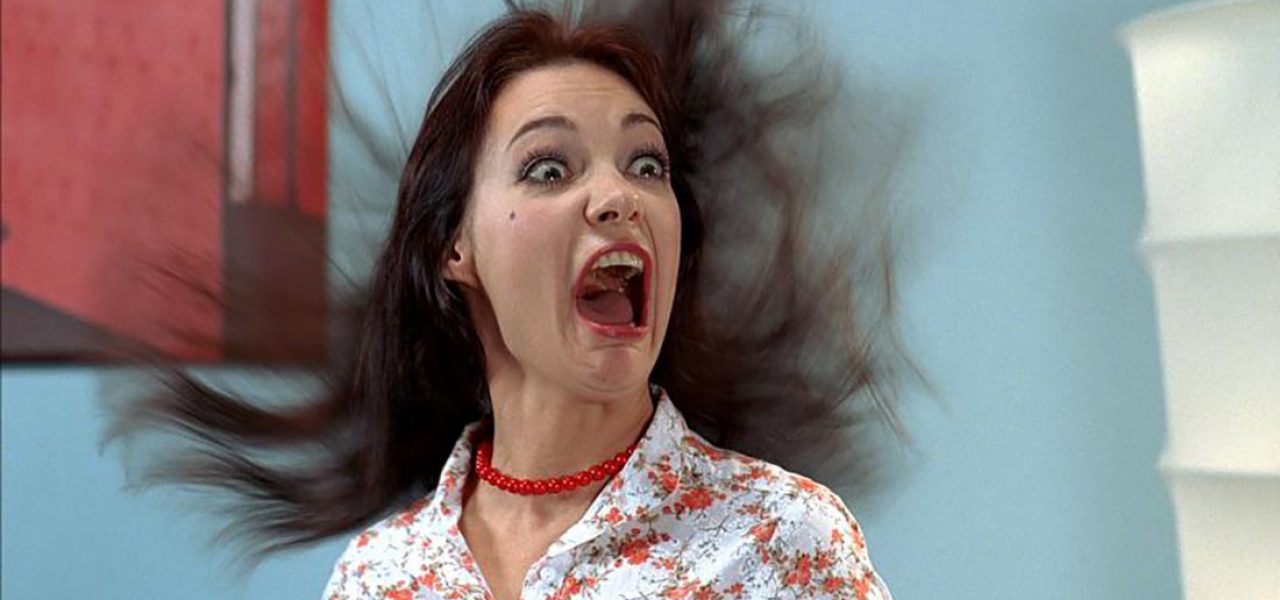
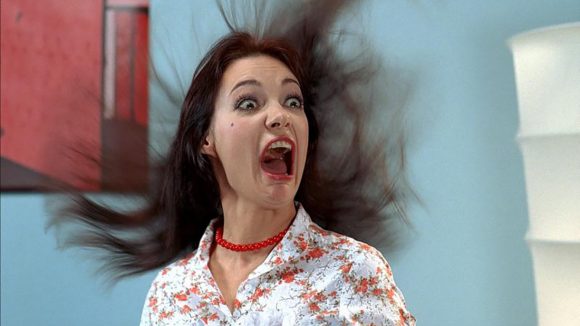
Ottawa Animation Festival 40th Anniversary Look-Back: ‘Inherent Obligations’
The Ottawa International Animation Festival, North America’s largest and most significant animation event, celebrates its 40th anniversary this year.
In honor of that occasion, the festival has commissioned a number of international animation historians, programmers and critics to write essays about each of its grand prize-winning films. In partnership with the festival, Cartoon Brew will present a number of essays week leading up to this week’s festival on September 21-25, 2016. We’ve already presented essays on The Man Who Planted Trees, Hen, His Wife, Two Sisters, and The Night of the Carrots. We continue the series today with 2009 winner, Inherent Obligations directed by Rao Heidmets.
To learn how to attend Ottawa this week, visit animationfestival.ca.
Ottawa 09 Winner: Inherent Obligations
Essay by Marcel Jean: “Life is a Lousy Reality Show”
He’s average. Chubby with unkempt hair that clearly won’t be around for much longer. He looks like he’s forty, although he may be slightly younger. He sits in front of the television on which a stream of violent images play, supplemented by the newscaster’s commentary. Slowly, he gives in to the allure of the spectacle. Reality, on display in all its obscenity, gradually numbs him. The rest of the world disappears.
She’s an attractive woman. Thirty, perhaps. Ignored by her man, she attempts to seduce him, then plans to leave, constantly wavering between the two. To save her relationship, to save herself, she concocts an elaborate seduction. She shimmies provocatively, trying desperately to attract his attention. She changes her hair, changes her dress, and even changes her entire look in the hopes of rivalling the dream girls that leap off the screen and monopolize her husband’s attention.
It’s the story of a man, like countless others, reduced to his voyeurism. A man consumed by the object of his gaze, rendered impotent by the shackles of his fantasy. It’s the story of a woman, like countless others, abandoned and neurotic, searching for a way to exist. It’s the story of a couple, like countless others, a miserable union of two irreconcilable solitudes. It’s the story of a distorted, absurd, and crazy world, media-centric and enslaved by the obscene representation of raw reality, its manufactured analysis filtered of all thought. A world that, in the end, isn’t so different from our own.
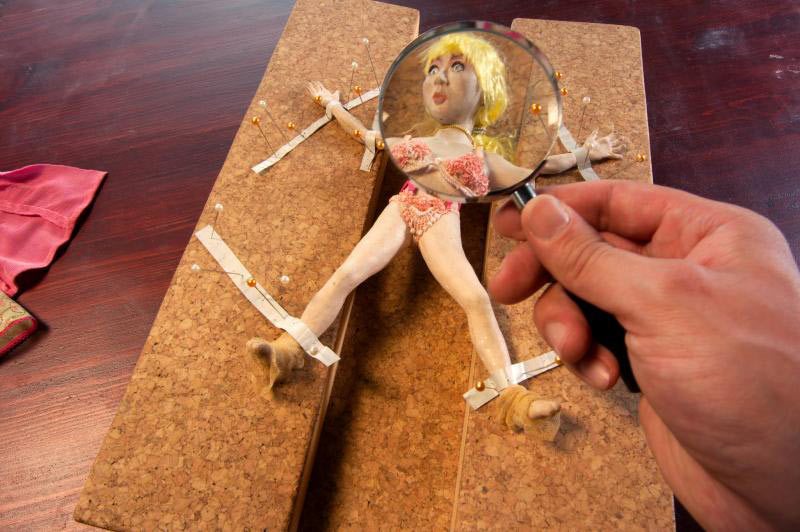
This is the story of the short film Inherent Obligations (2008), directed by Estonian filmmaker Rao Heidmets. The film, which is the prolific artist’s fourteenth short, received honors in Sienna (Italy), Fredrikstad (Norway), and Poznan (Poland), and was awarded the Grand Prize in Ottawa.
Born in Pärnu in 1956, Heidmets completed his studies in electrical engineering before embarking on a career in animation. He started out working for other filmmakers and moved to directing his own films in 1983. The Theatre Papa Carlo (1988; in competition at Cannes; Grand Prize at Espinho) and Noblesse Oblige (1989) both brought him worldwide recognition.
Although some of his work is made for younger audiences (Dove Aunt, 1983; The Gnome’s Tree, 1991), the majority of Rao Heidmets’ films, which explore themes of power and freedom, are intended for adults.
His characters are often puppets (in every sense of the word), trapped in a system that is unravelling, as represented by the cage in The Giraffe (1986), the stage in The Theatre Papa Carlo, and the masquerade ball in Noblesse Oblige. A particularly telling representation is the flat earth in his 2003 film, Instinct, which reveals, from Heidmets’ perspective, how the collapse of the Soviet Union changed nothing: alienation and the desire to break free still remain. What difference does it make whether power belongs to God or the Devil? The world is nothing more than an oppressive machine. Freedom and chaos are often synonymous.
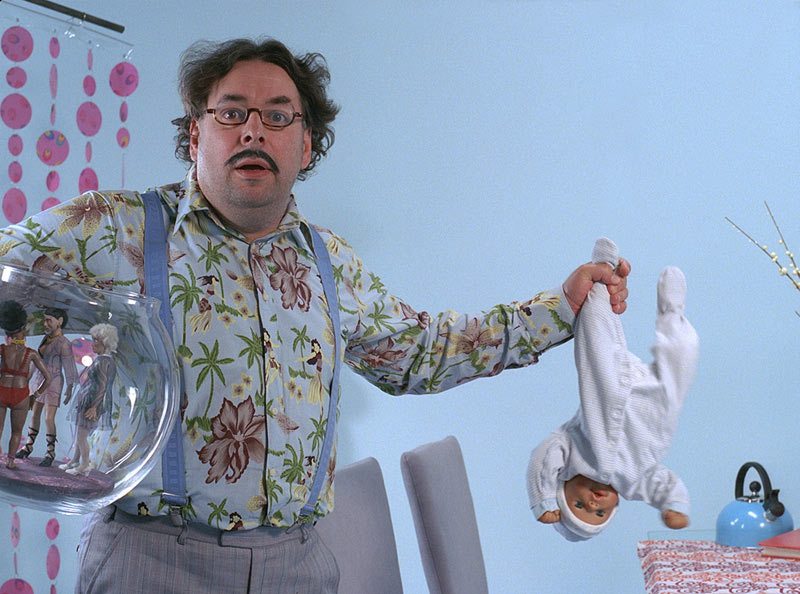
The Living Room (1994) depicts a young girl trapped in an ambiguous relationship with an old man. Her mother’s secret visits do not fulfill her so she physically erases her world, replacing it with a new, naïvely-drawn one, a world that better meets her expectations. Like Inherent Obligations, The Living Room is mainly pixilated using live actors. Along with The Giraffe, these are the only films of Heidmets’ that have a positive outcome, one in which the female character escapes a warped and alienating reality, thus finding some kind of freedom.
The thematic uniformity of Heidmets’ films is particularly remarkable because it is in such sharp contrast with their aesthetic and technical diversity. Although his chosen technique of stop motion is a constant, Heidmets seems to delight in changing styles from one film to the next, most notably through his use of a wide range of materials (wood and straw for Noblesse Oblige and textile fibers for Oracle is Born?, 2011, to name but a couple) and aesthetic approaches (it is surprising to note that the primitive expressionism of his 2006 film, Pearl Man, came on the heels of the naïve realism of Instinct).
Among Heidmets’s other signature ingredients, the non-linearity of the editing, the use of repetition as a narrative tool, the frantic rhythm of specific sequences, and the aggressive use of sound are all worth mentioning. These four elements are at the core of Inherent Obligations, which, with its ever-present and powerful music, its repetitive transitions, and its fast-paced editing, has the feel of a music video.
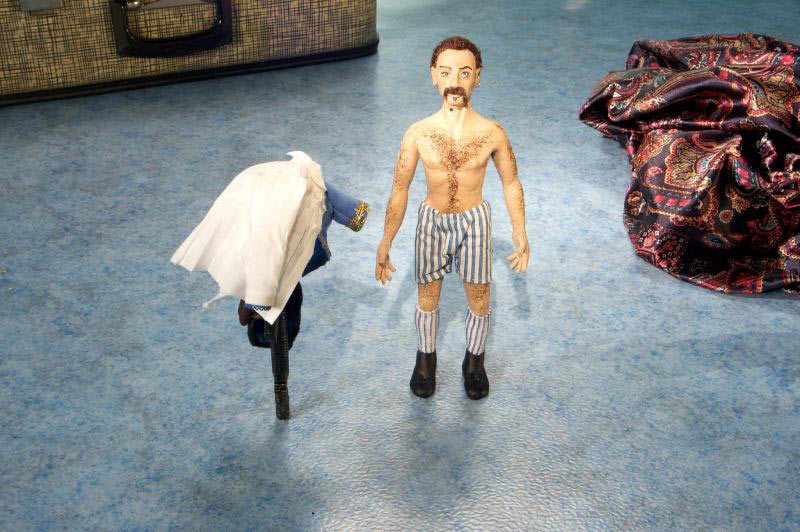
Rao Heidmets’ films all end up having that unbridled look, as if they had been urgently and abruptly cast out the moment they were done, with no concern for finishing touches or fine-tuning. These imperfect, chaotic, unrefined films, with all their rough edges, exude unique, raw energy. Like the sound of chalk on a blackboard, they provoke, irritate, and, at times, cause us to grit our teeth.
As a social critique that speaks directly to the viewer, Inherent Obligations attacks our complacency and points a finger at our voyeurism, ineffectuality, lack of political analysis, and inability to take control of our miserable existence. Modern man, as a passive spectator overstuffed with violent images, is doomed. He is nothing more than a ridiculous clown: a bit of a masochist, a bit of a sadist, plugged into his TV (or computer, or cell phone, it’s all the same) like an overfed baby sucking his bottle. His wife can still hold out hope, on the sole condition that she come to the realization that there is nothing more she can do to save her man. She alone can free herself, abandon the shackles of the marriage bed, and walk through the city with her head held high. So long as this apparent freedom is not, of course, an illusion itself.
(Translated from French by Alexandra Grimanis)

